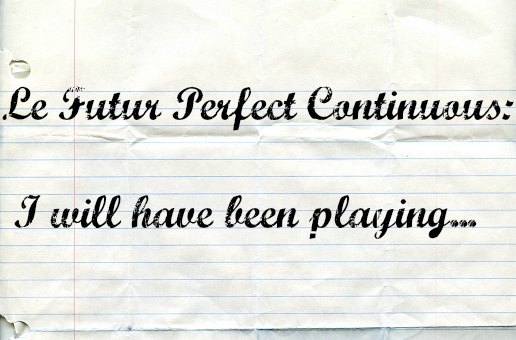Le futur perfect continuous (I will have been playing)
Le future perfect progressive (ou continuous), aussi appelé en français futur antérieur progressif, est assez difficile à maîtriser mais peut s’avérer pratique.
GAGNEZ DU TEMPS ! TÉLÉCHARGEZ EN UN CLIC LE PACK COMPLET: 70 FICHES DE GRAMMAIRE + LES TEMPS EN PDF
PLUS D'INFOS_
On l’utilise pour dire pendant combien de temps quelque chose aura duré jusqu’à un moment donné du futur. La durée de l’action est généralement spécifiée avec l’expression de temps for ou since (for 5 minutes, for two years, since thursday…). Le point auquel l’action aura été réalisée est souvent indiqué au présent simple avec when ou by the time.
- On january 1st he will have been working at the factory for more than a year . (= En janvier ça fera plus d’un an qu’il travaille à l’usine.)
- In just one week from now I will have been living in Tokyo for five years (= D’ici une semaine seulement j’aurai vécu à Tokyo depuis cinq ans).
1/ Formation
sujet + will have been + verbe + ing
| Affirmative_ | Négative | Question | |
|---|---|---|---|
| I / you / he / she / it we / you / they_ | I will have been playing | _I will not (= I won’t) have been playing _ | _Will I have been playing?_ |
- (+) You will (= You’ll) have been playing video games for two hours when her plane finally arrives.
- (?) Will you have been playing video games for two hours when her plane finally arrives?
- (-) You will not (= won’t) have been playing video games for two hours when her plane finally arrives.
2/ Utilisation
* Durée avant un événement futur
Vous remarquerez que les points de référence sont au present simple.
- By the next year, Sarah and her husband will have been living together for twenty years.
- We will have been talking for over an hour by the time Thomas arrives.
- He will have been working at that company for three years when it finally closes.
- Thomas will have been teaching at the university for 2 years by the time he leaves for Thailand.
- How long will you have been studying when you graduate?
- They will have been driving for four hours when they get to Melbourne.
- When you finish your job, will you have been living in New Zealand for over a year?
- Before they come, we will have been cleaning the house for two hours.
* La conviction de la cause d’une situation future
Utiliser le future perfect continuous avant une autre action future est un bon moyen pour montrer la cause à effet
- Tina will be tired when he gets home because he will have been working for 12 hours
- Romain’s english will be perfect when she returns to France because he is going to have been studying English in London for over two years.
- By this time, he will have been jogging for over an hour so he will be very tired.
- We will be making a rest stop in half an hour, because you will have been driving the car for 6 hours by then.
3/ A savoir
⚠️ Quelques expressions de temps courantes au futur perfect continuous:
by tomorrow / 8 o’clock / 8pm / this year / month / week / next year / next month / next week
⚠️ Future Continuous ou Future Perfect Continuous ?
Si on n’indique pas une durée comme ‘for ten minutes‘, ‘for two weeks‘ ou ‘since Friday‘, de nombreux anglophones préfèrent utiliser le futur continu plutôt que le future perfect continuous. Faites attention car cela peut changer la signification de la phrase.
Le futur continu met l’accent sur l’action interrompue, tandis que le future perfect continuous met l’accent sur une durée avant un événement futur.
- He will be tired because he will be exercising so hard. (Il sera fatigué car il aura fait du sport à ce moment précis du futur)
- He will be tired because he will have been exercising so hard. (il sera fatigué car il a été en train de faire du sport pour une certaine période de temps. Il est possible qu’il continue à faire du sport ou qu’il ait juste terminé)
⚠️ Les expression de temps suivantes ne sont pas utilisées au futur perfect continuous:
when / while / before / after / by the time / as soon as / if / unless
- You won’t get a promotion until you will have been working here as long as Tim. ❌
- You won’t get a promotion until you have been working here as long as Tim. ✔️
⚠️ Pas de verbes d’état au futur perfect continuous
- Tom will have been having his motorbike for over one year. ❌
- Tom will have had his motorbike for over one year. ✔️
⚠️ Forme active / passive
La forme passive au future perfect continuous n’est pas courante:
- Matt will have been fixing the car for over six weeks by the time it is finished. (Active)
- The car will have been being fixed by Matt for over six weeks by the time it is finished. (Passive)
©Anglais-rapide.fr – ne pas recopier ces leçons sur d’autres sites !


excellent document outils tres complet pour apprendre l anglais
Très bien conçu !!!!!
Thanks